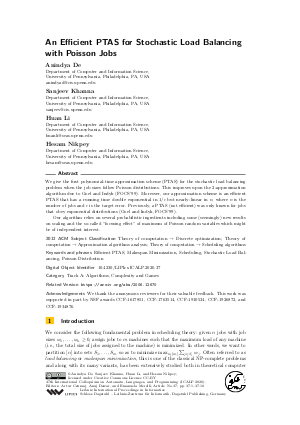@InProceedings{de_et_al:LIPIcs.ICALP.2020.37,
author = {De, Anindya and Khanna, Sanjeev and Li, Huan and Nikpey, Hesam},
title = {{An Efficient PTAS for Stochastic Load Balancing with Poisson Jobs}},
booktitle = {47th International Colloquium on Automata, Languages, and Programming (ICALP 2020)},
pages = {37:1--37:18},
series = {Leibniz International Proceedings in Informatics (LIPIcs)},
ISBN = {978-3-95977-138-2},
ISSN = {1868-8969},
year = {2020},
volume = {168},
editor = {Czumaj, Artur and Dawar, Anuj and Merelli, Emanuela},
publisher = {Schloss Dagstuhl -- Leibniz-Zentrum f{\"u}r Informatik},
address = {Dagstuhl, Germany},
URL = {https://drops.dagstuhl.de/entities/document/10.4230/LIPIcs.ICALP.2020.37},
URN = {urn:nbn:de:0030-drops-124449},
doi = {10.4230/LIPIcs.ICALP.2020.37},
annote = {Keywords: Efficient PTAS, Makespan Minimization, Scheduling, Stochastic Load Balancing, Poisson Distribution}
}

 Creative Commons Attribution 3.0 Unported license
Creative Commons Attribution 3.0 Unported license

















